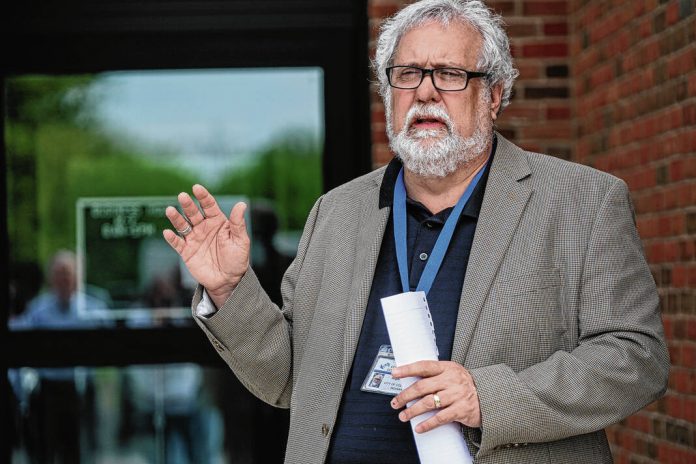
Mike Wolanin | The Republic
Columbus City Utilities Director Roger Kelso addresses guests during a ribbon cutting ceremony to introduce the remodeled and updated area of the Columbus City Utilities building in Columbus, Ind., Thursday, April 20, 2023.
COLUMBUS, Ind. — Columbus City Utilities is planning a solar project at its wastewater plant with an estimated price tag of $2.3 million, though a tax credit is expected to lower the cost by around 30%.
“We are looking at installing solar panels on our property at the wastewater treatment plant,” said utilities engineer Ashley Getz. The array will be located west of the plant and be just under 2.5 acres. The plant itself is located off of State Road 11.
According to CCU Executive Director Roger Kelso, the solar array will be located in a field that is utilities property, and they will not need to acquire additional ground for the project.
The one-megawatt system will allow CCU to cut energy purchasing at the plant by 30%, Getz said. It’s expected this will save them $140,000 for the first year. Savings in future years will depend on how much the cost of electricity increases over time.
“The calculations are annually about 1,150 tons of carbon dioxide eliminated from the carbon footprint,” she added.
The project is still in the planning stage, but an initial study looks promising, Kelso said. The work could start next spring or early summer. The estimated cost, at the study level, was $2.3 million.
A formal design has not been completed yet, but he expects the actual price to be approximately the same and added that study estimates are usually “a little bit higher.”
It’s estimated that a tax credit made possible by the Inflation Reduction Act (IRA) will result in a reduction of almost 30% or $560,000 to the project cost, said Doug Baldessari, a partner with Baker Tilly’s public sector practice. The firm helped the utilities navigate the clean energy incentives offered through the IRA.
The tax credit will be received through reimbursement once the project is complete, he said. Additionally, since IRA is a 10-year program, Columbus City Utilities will not be required to have everything finished right away.
“Really, there’s never been a better time to do a solar project or other sustainability, clean energy projects than right now or next year or any time in the next 10 years, with the Inflation Reduction Act and the significant tax credits and reduction to the local costs that have to be paid by the ratepayers,” Baldessari said.
Kelso said that the project is very likely to go forward and is “almost a no-brainer,” given the numbers, though there will be certain approvals required for the work.
“This is a project that allows us to be more green and … future-proof (ourselves) on additional rate increases into the future as far as the total utility cost,” he said. “And it makes us more sustainable and resilient because of those components.”
Getz also noted that the project provides a way to utilize land that currently acts as a buffer between wastewater tanks and neighboring homes and is “basically unusable otherwise.”




